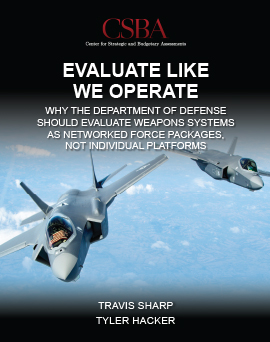
On September 20, 2023, CSBA held a webinar discussion on the release of our new report, Evaluate Like We Operate: Why DOD Should Evaluate Weapons Systems as Networked Force Packages, Not Individual Platforms, by Travis Sharp and Tyler Hacker. The event included remarks from the authors followed by a Q&A moderated by Dr. Mahnken.
ABOUT THE REPORT
Weapons do not conduct military operations in isolation from one another, and yet the U.S. defense community devotes considerable attention each year to individual platforms. The time spent appraising specific weapons is understandable, given the huge investments and cutthroat politics surrounding these projects, not to mention the defense budget boiling everything down to line items, but is misplaced in a strategic context.
In Evaluate Like We Operate, Senior Fellow Travis Sharp and Research Fellow Tyler Hacker propose that the defense community should instead evaluate weapons in terms of networked force packages, or NFPs, a middle layer above individual weapons systems and below battle networks and force structure. As the title indicates, this approach closely mirrors how the U.S. military actually employs these weapons systems and will become crucial as future force structures incorporate attributable drones, loitering weapons, and unmanned munition carriers that blur the lines between platform and weapon. Sharp and Hacker provide two illustrative analyses of the NFP approach, first applying it to the operational advantages of next-generation munitions and then reassessing the cost-effectiveness of advanced fighter aircraft by incorporating mission-level cost avoidance. The authors conclude with possible additional areas where the NFP approach could illuminate operational advantages and cost savings, as well as implementation strategies to overcome organizational and political resistance. By embracing the NFP approach, DoD will leverage an enduring U.S. advantage–openness to rigorous analysis, even if contrarian–to compete more effectively against China and Russia.



























